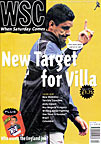 Manchester City fans have high hopes for the Millennium Stadium. Ashley Shaw wonders why
Manchester City fans have high hopes for the Millennium Stadium. Ashley Shaw wonders why
At one stage Maine Road possessed the tallest floodlights in English football, but with the advent of super stadia the place has come to resemble a relic – a reminder of the club’s glory days.
Local residents have long complained about the noise and filth of matchdays, while the new Kippax stand has interfered with the reception of Channel 4. The club’s attitude to local residents has veered between arrogance and conciliation, both sides believing a move to be long overdue. So it was little wonder that former chairman Francis Lee leaped at the opportunity presented by Manchester’s successful bid for the 2002 Commonwealth Games. The contest for the national stadium was always likely to be won by Wembley. But Manchester claimed second prize when over £120 million was awarded for the construction of Commonwealth Games facilities. The Millennium Stadium, being built in Eastlands, will cost £90 million and have a capacity of 48,000. It will be adapted for football purposes after the Commonwealth Games closing ceremony.
From the outset Manchester city council, keen to avoid accusations that the new stadium would be a white elephant, have held long-running talks with the Manchester City hierarchy aimed at securing their anchor-tenancy once the 2002 games are over. And despite the stalling of initial discussions, following a request from Lee that the council buy back Maine Road at an inflated cost of £30 million, a change of chairman and a more realistic assessment of City’s financial position has led to an agreement in principle between the council and the club.
City’s present parlous financial state is underlined by the debt the club still owe on the new Kippax stand, built at a prohibitive cost under Lee in 1995 in accordance with the recommendations of the Taylor Report. While some City fans have mixed feelings about the move from south-central to east Manchester, the majority welcome it as an opportunity to remove the monkey from the club’s back.
Many Blues believe that the Moss Side ground is the reason behind City’s freefall through the divisions. Some blame City’s long run of bad fortune on a curse put on the Platt Lane stand following the eviction of Romanies from the Maine Road site to make way for the building of the football stadium in 1922. Some club officials, meanwhile, swear blind that the ghost of a former director stalks the deserted Maine Road main stand.
The site of the 2002 Comonwealth Games offers no such bad luck. Set in acres of isolated splendour, City will move to the new stadium in time to start the 2002-03 season pending the signing of a legally binding agreement within the next two months.
Lottery money will pay for £77 million of the £90 million construction fee with the remaining £13 million coming from the council and the club. As a result, Maine Road, the holder of the record attendance outside London and Glasgow (84, 569 v Stoke, FA Cup quarter-final 1934), will soon be consigned to history. Ironically, another reason for optimism among City fans has been the overwhelming financial success of rivals United. As accountant and City fan Phil Hamnett explains, “You can’t get in to see United now, games are sold out months in advance and working class kids can’t afford £20 a game.
“If City have any sense they will see United’s success as a positive thing. When they move to the new ground they should encourage young fans by offering them concessionary tickets. Then hopefully the kids will grow up as Blues and the place could be sold out in years to come. The knock-on effect with merchandising and the like could make the difference in the future.”
Of course, this positive view depends on where City are in three seasons’ time. Some critics have even suggested that City could have the finest stadium in the Conference by the time they move to their new home.
Promotion and an upturn in the club’s current lamentable financial position are a must if the club is to take advantage of the opportunity a new home could afford – many see the move as a reprieve for the club, a last opportunity to capitalise on City’s growing support. At the moment the stadium is being constructed with athletics in mind. But once the 2002 Games are over the running track will be excavated and stands built down to pitch level. Two-tier stands are being constructed along the straights of the running track while the ends will house one-tier temporary stands. The result, some Blues claim, will see City play in the finest stadium in British league football. Whether City will be toasting success in their Last Chance Saloon is anyone’s guess.
From WSC 146 April 1999. What was happening this month